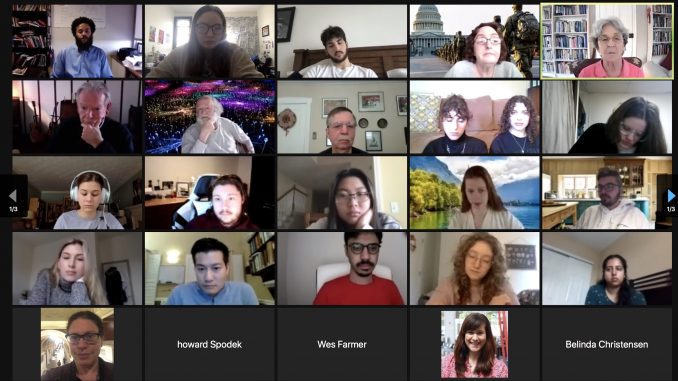
After Tom Flynn watched images of smashed windows at the United States Capitol and congressional officials ducking in the House Chamber flash on the television on Jan. 6, he questioned how American democracy would continue afterward.
A conversation with political scientists seemed like a good place to start to dissect his thoughts.
“We all watched history on the sixth happen, and we’ve been watching history happen for the past four years, in the past year, and the past two weeks, and it’s been unpleasant,” said Flynn, a junior political science major. “But it’s not like it all just goes away if you don’t talk about it.”
More than 60 students, alumni and faculty gathered on Jan. 22 on Zoom to discuss the Jan. 6 attack on the U.S. Capitol in Washington, D.C. Ralph Young, a history professor, hosted the event and Robin Kolodny, chair of the political science department, moderated a panel of political science professors including Nyron Crawford, Barbara Ferman and Sean Yom.
On Jan. 6, the day the U.S. Senate was to verify the results of the 2020 presidential election, a mob of former President Donald Trump’s supporters stormed the Capitol building in Washington, D.C. in an attempted insurrection after Trump tweeted on Dec. 19, 2020, “Big protest in D.C. on January 6th. Be there, will be wild!” Trump supporters hoped former Vice President Michael Pence would block the Senate vote to certify the results of the election, the New York Times reported.
On Friday, faculty, students and other participants discussed how the rise of white supremacy and the Trump presidency led to the attack on American democracy on Jan. 6.
Crawford started the discussion with the history of white supremacy in the United States, beginning with the Reconstruction Era and moving into the rallies against COVID-19 restrictions at State Capitol buildings in April 2020, where in places like Michigan, armed protesters entered the building.
The misinformation about the results of the November 2020 election supported the fissure between political parties, leading to insurrection on Jan. 6, Ferman said.
Young has held teach-ins about “controversial subjects” for the last 20 years, providing a space for students to discuss political issues within the U.S. ranging from the Patriot Act in Spring 2003 to “Politics of the Pandemic” in Fall 2020.
While Black and brown people face more repercussions from law enforcement, which was seen by federal agents being brought into cities like Chicago and Philadelphia during the summer, white people do not experience the same level of consequences, Crawford said.
“In thinking about events that happened on Jan. 6, we have to ask, ‘Who gets watched? Who is the threat?’” Crawford said.
While Trump did not create white supremacy, xenophobia or misogyny, he made those beliefs mainstream, Ferman said.
“What he did was legitimize them and turn supporters of them into patriots,” she said. “He appealed to our worst possible instincts and valorized them.”
On Jan. 6, many Americans viewed the Capitol riots as a coup attempt, Yom said. But it was actually what comparative political scientists call a self-coup, which is when a branch of government, usually the executive branch, attempts to expand their power by destroying or undermining other branches of government, he added.
“It’s essentially a coup against one’s government designed to perpetuate, not seize, but perpetuate one’s existing base of power,” Yom said.
Jeremy Downey, a 2016 political science alumnus, learned about the teach-in on Twitter and attended because he went to teach-ins as a student.
After Jan. 6, Downey was unsure how he should feel or what he should think about the attack. He wanted to hear what political scientists felt about the day, he said.
“These things really hit home,” he added. “Hearing what people I trust and respect have to say, and answers to the questions that I asked, it helped me kind of understand more what happened and how we can move forward.”
While the discussions generally don’t come to a definitive conclusion, Young believes the main point of them are to understand and make sense of what is happening in the U.S., he said.
“What’s important is not so much to come up with the right answers to an issue, but to come up with the right questions,” he added.
Downey said the discussion helped him cope and helped him start to understand how to move forward from Jan. 6.
“I grew up being told you don’t talk about politics or religion,” Downey said. “If you don’t sit down and talk about it at the kitchen table, you’re not going to want to vote on that.”


Be the first to comment